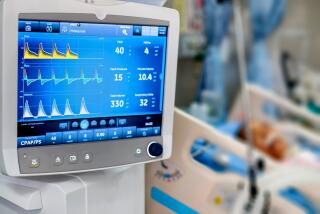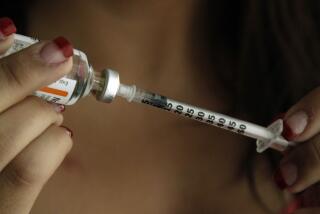Taking aim at diabetes
- Share via
Diabetes has reached epidemic proportions around the world. In the United States, about 26 million people have it — and 7 million of those don’t know they have it. In addition, there are an estimated 79 million adults with pre-diabetes — and many of them don’t know either. The most common form of diabetes by far is Type 2, which does not require insulin shots for treatment; its rise is closely linked to the rise in obesity.
And here’s some more troubling news: A recent study published in the New England Journal of Medicine says a 50-year-old with Type 2 diabetes will lose an average of six years of life as a result of the disease. That person is twice as likely to die of cardiovascular disease as someone without diabetes. People with Type 2 diabetes also die more often from kidney disease and liver disease.
But there’s some good news too: Type 2 diabetes is a reversible public health crisis, according to the American Diabetes Assn. Most sufferers can cure themselves with moderate changes in diet and lifestyle, mainly by eating less and exercising more. Even losing five to 10 pounds can have a significant effect, according to experts. People who work in the field of diabetes prevention and cure would like you to look at it this way: Pay less now or pay more later. Literally. Treating Type 2 diabetes is much less expensive than treating its complications.
Diabetes hits African American and Latino communities particularly hard, in part because of dietary habits and genetics.
The first big step: People should get screened. We’d like to see more companies offer free screening for diabetes to employees. It’s a good investment in their workforce, a hedge against costly and debilitating illnesses.
The American Diabetes Assn Expo next Saturday at the Los Angeles Convention Center will offer a variety of events, including cooking demonstrations and sessions with healthcare professionals. (The Los Angeles Times is a sponsor.) Admission is free. Parking is $12. Best of all: Anyone who shows up can get screened for diabetes for free.
More to Read
A cure for the common opinion
Get thought-provoking perspectives with our weekly newsletter.
You may occasionally receive promotional content from the Los Angeles Times.









